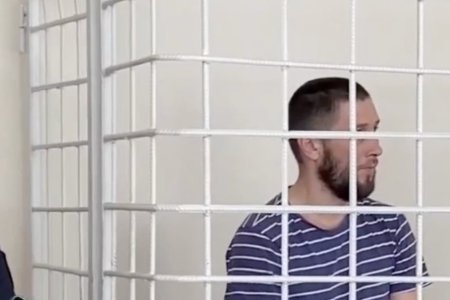
56-year-old Suleiman Yusupov was arrested at the end of August for calling Russia’s attempts to block YouTube an attack on his and others’ freedom. Russia’s deliberate blocking of the vital YouTube platform by drastically slowing video playback speed is an evident attempt to block access to information on occupied territory, as well as in Russia, however Yusupov was seized, forced to make a ‘videoed apology’ and sentenced to ten days administrative arrest. Yusupov was the latest victim of notorious collaborator Aleksandr Talipov’s Crimean SMERSH activities in hunting out Crimeans for expressing pro-Ukrainian views. As always, these were in close collaboration with Russia’s so-called ‘centre for countering extremism’.
Crimean Realities has followed Yusupov’s persecution from Talipov’s Crimean SMERSH Telegram channel ‘report to the police’ on 30 August 2024 to the ‘court’ sentence. That ‘report’ is, in fact, a video in which a man is addressing a group of young people who are covertly recording this. He says: “I am for freedom. Why have they just switched off YouTube? YouTube is everything, the whole world. We see the whole world on YouTube. I’ll be 60 soon, and I get a buzz out of YouTube. And now they’ve gone and cut my YouTube. They are killing your freedom. Freedom! Why are you silent? What are you afraid of? Fuck your damn Putin. He’s old, he’ll die tomorrow.”
The next video, posted that same day, shows Crimean Suleiman Yusupov reciting a text he has clearly been forced to read out, ‘apologizing’ for his words against ‘the president’ (i.e. Russian leader Vladimir Putin) and claiming that he had spoken under the influence of alcohol.”
All of this is the standard format, in which Crimean SMERSH pretends to be reporting pro-Ukrainian / anti-Russian comments, etc. to the ‘police’ and then shows the person ‘repenting’. It is unclear in any given case whether physical duress has been applied, or merely threats of criminal charges if they do not oblige. The claim that Talipov’s Crimean SMERSH is ‘a civic initiative’ does, however, overstretch credulity. The videos ‘repenting’ are very often made in occupation police offices, with the timing between denunciation, videoed ‘repentance’ and ‘court hearing’ clearly indicating close collaboration with the occupation ‘enforcement bodies’.
It was Talipov on 30 August who reported that Yusupov had been jailed for ten days. The details on the site of occupation ‘Krasnohvardiiske Raion district court’ only mention two administrative prosecutions, both seemingly under ‘petty hooliganism’ (Article 20.1 § 1 of Russia’s administrative code). Since the number of the case is identical, the charges were presumably related. The term ‘hearing’ would not be appropriate, since the first charge was scheduled to be ‘considered’ at 12.45, the next just 10 minutes later, at 12.55. Both administrative ‘punishments’ were imposed by ‘judge’ Sergei Nikolayevich Proskurnia.
Russia began systematically destroying independent media, crushing freedom of speech and persecuting journalists immediately after its invasion and annexation in 2014. This was one of multiple reasons for the damning judgement passed by the European Court of Human Rights on 25 June 2024 in the first of Ukraine’s inter-state cases against Russia.
Russian state deputy Aleksandr Khinstein first reported on 25 July 2024 that Russia would deliberately slow YouTube down, claiming that this was because of YouTube’s supposedly ‘anti-Russian policy’. It had, Aleksandr Khinstein said, removed the channels of bloggers, journalists, etc who, in his rendition, had a position that differed from that held in the West. In fact, channels, including the Kremlin-funded propaganda channels RT and Sputnik, were removed for being in violation of YouTube standards.
By 8 August, the download speed had made it impossible to watch YouTube videos in occupied Crimea, Donetsk and Luhansk. The move was condemned as the Kremlin’s latest method of censorship by Reporters without Borders. .
“The Kremlin is well on its way to achieving its disgraceful project of locking Russian citizens into an information prison where only propaganda is able to circulate freely. Despite its flaws, YouTube has continued to be one of the few remaining tools that independent Russian journalists in exile could use to disseminate reliable content to their fellow citizens. RSF condemns this censorship tactic and urges the authorities to restore normal video playback speed on the platform.
While RSF mainly focused on censorship in Russia, it should be recalled that Russia has deliberately created an information vacuum on all Ukrainian territory that has fallen under its control. A year before Russia’s full-scale invasion of Ukraine, Freedom House had found that occupied Crimea and Donbas were close in ranking to North Korea, with this worse than Russia’s own rating (and significantly lower than in government-controlled Ukraine). Since February 2022, more areas have been occupied with the scale of Russian terror and repression ever mounting.



